Mighty Mint: Peppermint Oil as a Rodent Repellent


Intro
In recent years, there has been considerable interest in natural pest control methods. Among these, peppermint oil has gained attention as a potential remedy for deterring rodents. This article will delve into the effectiveness of peppermint oil as a natural rodent repellent. It will cover the essential components that contribute to its repelling properties, methods of application, and implications for homeowners seeking a safer alternative to traditional rodent control measures.
While many are familiar with peppermint for its culinary and cosmetic uses, its role as a pest repellent needs closer examination. Understanding the science behind peppermint oil can help reveal its efficacy and application in maintaining a rodent-free environment.
The document will also provide practical guidance on creating and utilizing peppermint oil sprays, alongside a comparison to standard rodent control measures. Readers will discover how to implement these solutions effectively while considering the benefits and potential drawbacks of peppermint oil in long-term home maintenance.
By synthesizing this information, the goal is to equip homeowners and gardening enthusiasts with informed insights about employing peppermint oil for rodent control.
Preamble to Rodent Control
Understanding rodent control is critical for maintaining a clean and safe living environment. Rodents are not just a nuisance; they can pose significant health risks and cause structural damage to homes. Their presence often indicates larger problems, such as poor sanitation or openings in building structures that need to be addressed. Effective rodent control strategies can help homeowners mitigate these risks while enhancing their quality of life.
Overview of Common Rodent Problems
Rodents, particularly mice and rats, are common intruders in many households. Their ability to reproduce rapidly means that a small problem can quickly become a large infestation. These pests are often attracted to food sources, clutter, and areas that offer shelter. Mice can squeeze through tiny openings in walls and foundations, making them difficult to keep out. Common problems associated with rodent infestations include:
- Health risks: Rodents can carry diseases that affect humans, such as hantavirus, leptospirosis, and salmonella. Their droppings and urine can contaminate surfaces and food.
- Structural damage: Rodents gnaw on various materials, including wood, plastic, and even electrical wires. This behavior can lead to costly repairs.
- Food contamination: They often invade kitchens or pantries, contaminating stored food with droppings and urine.
Importance of Natural Repellents
Increasingly, people are showing preference for natural methods of pest control. Natural repellents, such as peppermint oil, offer a favorable alternative to chemical solutions. They can be safer for households with children and pets while still being effective at keeping rodents at bay. Utilizing peppermint oil not only targets the issue of rodent intrusion but also aligns with a growing trend of sustainable living.
Benefits of using natural repellents include:
- Environmental safety: Natural repellents are biodegradable and generally non-toxic.
- Pleasant fragrance: Unlike traditional chemical sprays, peppermint oil provides a refreshing scent that can enhance the indoor atmosphere.
- Cost-effectiveness: Making your own peppermint oil spray can reduce costs associated with commercial pest control products.
In summary, addressing rodent problems with effective methods is crucial. Understanding the benefits of natural repellents like peppermint oil positions homeowners to take proactive steps in ensuring their homes remain rodent-free, promoting longevity and safety in their living spaces.
Properties of Peppermint Oil
Understanding the properties of peppermint oil is crucial for appreciating its role as a rodent repellent. This essential oil has unique characteristics that contribute to its effectiveness. Not only does its strong scent deter rodents, but its chemical composition also plays a significant part in how it interacts with these pests. Homeowners seeking natural alternatives for pest control will find this information valuable.
Chemical Composition of Peppermint Oil
Peppermint oil is primarily composed of various compounds, with menthol and menthone being the most prominent. Menthol is responsible for the characteristic cooling sensation and strong aroma. These components are key to why rodents are repelled by peppermint oil. Studies indicate that the scent interferes with a rodent's ability to detect pheromones, which are critical for their social interaction and navigation. Other constituents, such as limonene and 1,8-cineole, further enhance its effectiveness, providing a multi-faceted approach to repulsion. Understanding this chemical makeup can help in designing targeted applications that maximize its impact.
Aromatherapy and Its Effects
Aromatherapy often utilizes peppermint oil not only for its pleasant scent but also for its numerous therapeutic effects. The scent of peppermint can promote a sense of clarity and focus in humans. However, its impact on rodents is markedly different; they associate the strong odor with danger or discomfort. This contrasting reaction can be leveraged for pest control.
Using peppermint oil in an aromatherapy context highlights its anti-anxiety and energizing properties, which can be beneficial for homeowners dealing with stress related to rodent infestations. By applying this knowledge, one can create an environment that is not only rodent-free but also mentally refreshing for residents.
"Peppermint oil’s intrinsic chemical composition and its hypnotic aroma are dual forces, making it a potent repellent against pesky rodents while imparting a serene ambiance for the home."
In summary, peppermint oil's properties combine chemistry with practical applications. This makes it a formidable player in natural rodent control methods. Homeowners can effectively utilize it to safeguard their spaces while also enjoying aromatic benefits.
Mechanism of Action Against Rodents
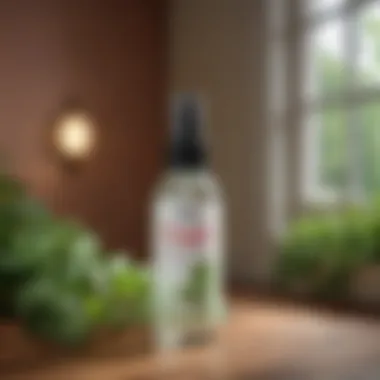
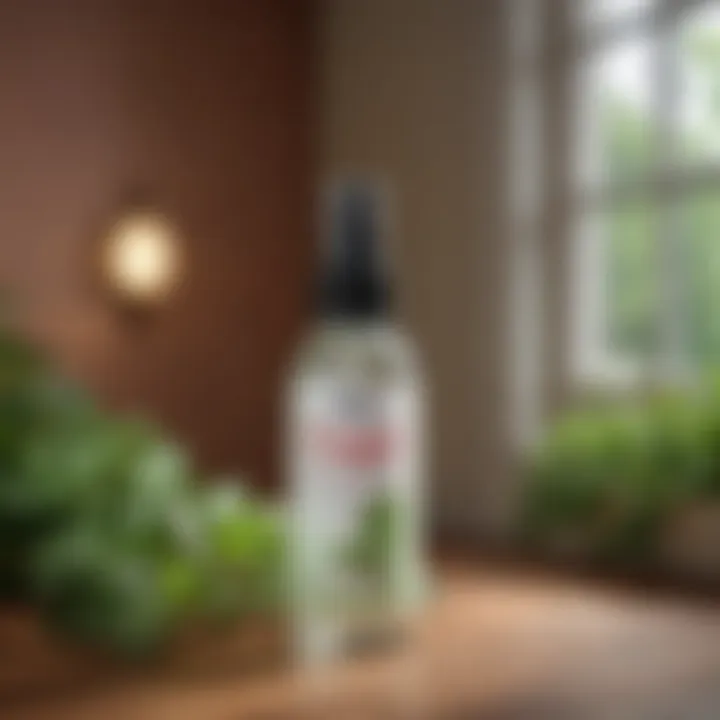
Understanding the mechanism by which peppermint oil acts against rodents is key to utilizing this method effectively. Rodent control is not just about keeping them at bay; it is about understanding how they perceive their environment and the factors that drive their behavior. Peppermint oil, when applied correctly, can significantly disrupt these factors. The key elements include sensory response and behavior modification.
Sensory Response of Rodents to Peppermint Oil
Rodents are known to have a keen sense of smell. Peppermint oil contains menthol, a component that creates a strong scent. This aroma can be overwhelming for rats and mice, as it interferes with their ability to detect food and mates. Research indicates that the strong smell of peppermint can cause immediate irritability or discomfort in rodents, effectively steering them away from treated areas.
For example, when peppermint oil is introduced in an environment, rodents might exhibit signs of anxiety. They may avoid the area altogether, opting for places with less pungent odors. Furthermore, the intensity of the smell can lead to physiological reactions such as increased heart rate. As a result, homeowners can utilize this sensory response to enhance their pest control efforts.
Behavioral Changes Induced by Peppermint Oil
Aside from its sensory effects, peppermint oil may also induce notable behavioral changes in rodents. Upon exposure to this essential oil, they tend to exhibit flight responses. This behavior is strongly rooted in the natural instincts of rodents to avoid potential threats, which in this case is the unfamiliar, powerful aroma of peppermint.
Research has shown that peppermint oil can lead to reduced nesting behavior and feeding patterns. Rodents might abandon usual foraging routes or nests that have been exposed to the oil. This change can significantly decrease their presence within a household environment. It is important to understand that these behavioral shifts are not instantaneous; they may take time to manifest but are generally observed within days of consistent exposure to peppermint oil.
Both sensory and behavioral responses to peppermint oil underline the importance of consistent application in targeted areas. Homeowners looking to adopt peppermint oil as part of their rodent management strategy must consider how quickly and effectively the oil works, rather than expecting immediate eradication.
"Peppermint oil not only repels rodents through its smell but also causes changes in their natural behaviors, steering them away from treated areas."
Overall, the mechanism of action highlights that peppermint oil acts as both a repellent through its sensory properties and a modifier of rodent behavior. This combination offers a practical pathway for effectively managing rodent issues without resorting to harsher chemical repellents.
Creating a Peppermint Oil Rodent Repellent Spray
Creating a peppermint oil rodent repellent spray serves as an essential component of natural pest control methods. Homeowners frequently seek solutions that are effective yet avoid the harsh chemicals found in traditional repellent products. A peppermint oil spray not only provides a safer option for households but also capitalizes on the natural properties of peppermint, making it both practical and environmentally friendly.
When addressing rodent issues, it is vital to consider that these pests often infiltrate living spaces when searching for food and shelter. Utilizing a peppermint oil repellent can help deter them, creating a barrier around affected areas. The process of creating such a spray is straightforward and allows homeowners to take charge of their pest control approach. By combining the right ingredients in proper proportions, one can achieve an effective deterrent that minimizes the chance of rodent sightings.
Ingredients Required
To create a peppermint oil rodent repellent spray, specific ingredients are necessary. Here is a list of the primary components:
- Peppermint Oil: This is the main ingredient and is key to the spray's effectiveness.
- Water: Acts as the base of the spray solution.
- Liquid Soap: A few drops help emulsify the peppermint oil with water, ensuring a consistent mixture.
- Spray Bottle: A container for easy application is essential.
Having these ingredients at hand will facilitate a smooth preparation process, making it easier to apply the repellent as needed.
Instructions for Mixing and Application
Mixing the peppermint oil rodent repellent spray can be done in a few simple steps:
- Measure the Ingredients: Use 1 cup of water, 10 to 15 drops of peppermint oil, and a few drops of liquid soap.
- Combine in a Spray Bottle: Pour the water first, followed by the peppermint oil and liquid soap into a clean spray bottle.
- Shake Well: Secure the lid and shake the bottle to combine all ingredients thoroughly.
- Test a Small Area: Before widespread application, test the spray on a small area to ensure no adverse reactions occur on surfaces.
- Apply to Target Areas: Focus on areas where rodent activity has been noted, including entry points and nesting areas.
This process is not only quick but also allows homeowners to refresh their repellent solution easily and frequently.
Recommended Dilution Ratios
Dilution ratios are critical in maximizing the efficacy of the peppermint oil spray without causing any adverse effects on the intended application surfaces. A suggested dilution ratio is:
- For First-Time Use: 10-15 drops of peppermint oil per cup of water.
- For Maintenance: 5-10 drops of peppermint oil per cup of water.
Adjusting the amount of peppermint oil based on observed effectiveness and specific areas can further enhance the spray’s repellent qualities. Remember that a higher concentration may create a stronger scent, which can be effective but might also necessitate more frequent reapplications in certain environments.
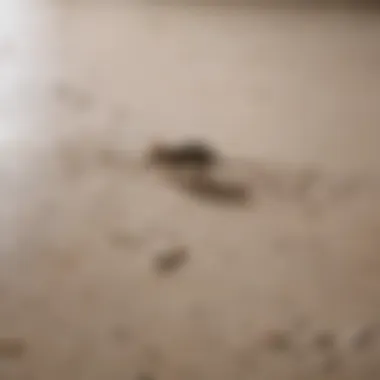

Best Practices for Application
Applying peppermint oil as a rodent repellent is not simply about spraying it anywhere. There are focused strategies that enhance its effectiveness. Care in application can determine whether the repellent works or fades into the background. Understand that rodents are typically drawn to areas where they can find food and safety. Hence, targeting specific locations can yield better results.
Target Areas for Application
Identifying the right spots for peppermint oil application is crucial. Here are some key areas to consider:
- Entry Points: Rodents often enter through gaps under doors and windows, or holes in walls. Spray peppermint oil around these areas. It can create a barrier that discourages entry.
- Food Storage Locations: Keeping peppermint oil around pantries and places where food is stored can deter rodents from munching on your supplies.
- Nesting Areas: Common nesting areas like attics, basements, and storage rooms should be treated. Targeting these locations can prevent rodents from establishing a home in your space.
- Garbage Zones: Areas around trash bins or compost should also be treated. Keeping these spots clear of rodent attraction can maintain a clean environment.
Applying the peppermint oil effectively in these areas can maximize the protection it provides against rodents.
Frequency of Reapplication
Reapplication of peppermint oil is vital for sustained effectiveness. Essential oils can dissipate, especially under varying environmental conditions. Here are some guidelines for reapplication:
- Initial Applications: Right after mixing the peppermint oil spray, apply it generously to the chosen areas. This sets a strong foundation for repeling rodents.
- Every Few Days: Initially, reapply every three days for the first two weeks. This helps establish a potent deterrent presence.
- Weather Considerations: Rain or high humidity can wash off the oil. After such weather, check areas and reapply as necessary.
- Monthly Maintenance: Once your space is rodent-free, consider a monthly touch-up. This maintains an ongoing defense and keeps the environment unwelcoming to new intruders.
Consistency is key in ensuring the efficacy of peppermint oil as a rodent repellent.
By focusing on target areas and maintaining a schedule for reapplication, homeowners can successfully enhance their defenses against unwanted rodent guests. These best practices for application will reinforce the effectiveness of peppermint oil, creating a safer, pest-free home environment.
Comparative Effectiveness of Rodent Control Methods
In the realm of pest management, the choice of a rodent control method significantly affects both efficacy and environmental safety. Homeowners often seek solutions that not only work but also align with health and ecological values. This section explores how peppermint oil compares with conventional chemical repellents while considering various factors like effectiveness, safety, environmental impact, and cost.
Peppermint Oil vs. Chemical Repellents
Peppermint oil stands as a natural alternative to traditional chemical repellents used for rodent control. Many chemical repellents contain strong pesticides, which can be harmful to non-target species, including pets and humans. In contrast, peppermint oil is derived from the Melaleuca piperita plant and offers a less invasive method for determent.
Research shows that combined odors of peppermint can irritate a rodent's sensory organs. The strong aroma effectively masks food scents, making it difficult for rodents to locate their food sources. While some scientific studies find peppermint oil to be effective, the extent varies.
- Advantages of Peppermint Oil:
- Disadvantages of Peppermint Oil:
- Natural and less toxic.
- Pleasant smell for humans.
- Easy to apply and non-invasive.
- May require frequent reapplications.
- Some users report variable results.
Conversely, chemical repellents provide instant results but often come with a plethora of risks. The synthetic nature of these products can lead to environmental contamination, affecting soil and water quality.
Environmental Impact of Different Methods
When analyzing the effectiveness of rodent control methods, it is also crucial to consider the environmental implications. Chemical reagents often leave harmful residues that can negatively affect local fauna and flora. Inert ingredients used to stabilize these chemicals might pose additional risks, affecting the ecosystem and biodiversity.
On the flip side, peppermint oil serves as a markedly eco-friendly option. Here are some factors to consider:
- Biodegradability: Peppermint oil is biodegradable and poses significantly less threat to aquatic ecosystems compared to chemical treatments.
- Safety for Non-Target Species: The natural formulation allows for safer use around pets and children, reducing the likelihood of accidental poisonings.
- Long-term Ecological Health: Maintaining an environment that encourages the employment of natural repellents promotes general biodiversity, aiding in a balanced ecosystem.
In summary, comparing peppermint oil with typical chemical approaches reveals a compelling narrative. While chemical products can quickly eliminate rodent issues, the longer-lasting impact of peppermint oil as a natural repellent becomes increasingly valuable in the pursuit of a sustainable and safe home environment.
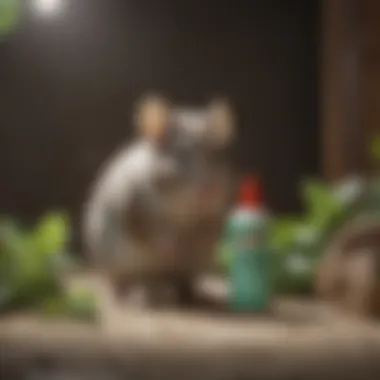
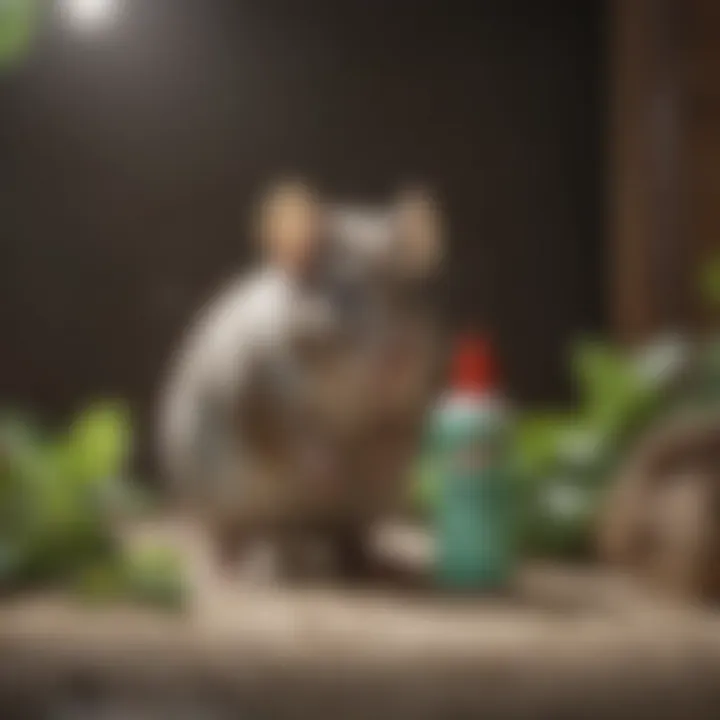
"Natural solutions like peppermint oil emphasize ecological health and integrative pest management, something increasingly appreciated by conscientious homeowners."
Overall, selecting the most effective method for rodent control requires evaluating various dimensions, from immediate results to long-term consequences.
Limitations of Peppermint Oil as a Repellent
While peppermint oil presents itself as a promising natural solution for rodent control, it is essential to acknowledge its limitations. Understanding these limitations not only helps homeowners set realistic expectations but also encourages the consideration of comprehensive pest management strategies. This section examines the primary drawbacks of peppermint oil as a repellent, emphasizing potential resistance development and variability in effectiveness.
Potential Resistance Development
One of the significant concerns regarding the long-term use of peppermint oil as a rodent repellent is the possibility of resistance development. Rodents, like many animals, can adapt to their environment over time. Repeated exposure to peppermint oil might allow some rodents to become less affected by its scent. Just as bacteria can develop resistance to antibiotics, rodents could similarly diminish their response to peppermint oil with ongoing use.
Research in pest management has shown how over-reliance on a single repellent may lead rodents to tolerate or even ignore it. This phenomenon may necessitate the rotation of different repellent methods for more effective control. Homeowners should be mindful that while peppermint oil may work initially, its long-term efficacy could falter as rodents adapt.
Variability in Effectiveness
Another limitation is the variability in the effectiveness of peppermint oil. Factors such as concentration, application method, and even the individual sensitivity of different rodent species can influence how well the repellent works. Some studies suggest that while peppermint oil may deter some rodent populations, it may not affect others similarly. This variability raises concerns about relying solely on peppermint oil for complete rodent control.
The effectiveness of peppermint oil can also be influenced by environmental conditions. For instance, high humidity or strong competing scents from other plants can reduce its efficacy. Homeowners might find that an area that previously repelled rodents effectively becomes less effective due to changes in the environment or rodent behavior.
Long-Term Considerations and Maintenance
When relying on peppermint oil as a rodent repellent, long-term considerations are crucial for maximizing its effectiveness and ensuring a sustainable pest control strategy. It involves understanding how environmental factors, the behavior of rodents, and the potency of essential oils can affect the overall success of this method.
Regular Monitoring for Rodent Activity
Regular monitoring for rodent activity is paramount. It allows homeowners to assess the effectiveness of peppermint oil repellent and make necessary adjustments. Consistent observation helps identify high-risk areas where rodents are likely to invade. Signs of rodent presence include droppings, gnaw marks, or nesting sites.
Start by setting up a schedule, checking areas such as attics, basements, and around food storage. If signs of rodents appear, it may indicate that the peppermint oil spray may require refreshing or that the pests have developed resistance. Homeowners should document findings to establish patterns over time, which aids in tailoring the approach to pest control.
Storage and Preservation of Peppermint Oil
Proper storage of peppermint oil is vital for maintaining its potency. Essential oils can degrade if not stored correctly, leading to diminishing effectiveness over time. Store peppermint oil in a cool, dark place, away from direct sunlight. This environment reduces the risk of oxidation and evaporation.
Use airtight containers to prevent exposure to air, which can diminish fragrance strength. Glass containers are preferable, as plastic can leach chemicals into the oil. When not in use, check the expiration date; some oils can become less potent months after opening.
It is also wise to keep a stock of fresh peppermint oil on hand, as regular reapplication is necessary for continued effectiveness.
According to research, essential oils maintain their quality longer when kept in an appropriate storage environment.
End
The effectiveness of peppermint oil as a natural rodent repellent is a pertinent topic for homeowners and individuals who prioritize environmentally friendly methods of pest control. Understanding how peppermint oil functions to deter rodents can offer significant advantages to those looking for alternatives to chemical-based solutions. This article emphasizes essential elements such as the unique properties of peppermint oil, its application methods, and the science behind its sensory impact on rodents.
Summary of Key Points
In reviewing the various sections of this article, several key points emerge:
- Properties of Peppermint Oil: The chemical components of peppermint oil, primarily menthol and menthone, contribute to its effectiveness as a repellent.
- Mechanism of Action: Rodents exhibit a strong sensory aversion to peppermint oil, leading to behavioral changes that can help keep them at bay.
- Application Methods: Homeowners can formulate peppermint oil sprays easily, with clear guidelines on ingredients and recommended ratios.
- Best Practices: Identifying target areas and adhering to a consistent application schedule can enhance the effectiveness of peppermint oil as a repellent.
- Comparative Insights: Understanding the limitations of peppermint oil alongside other control methods provides a balanced view of pest management.
Final Thoughts on Natural Rodent Control
Natural pest control solutions like peppermint oil present a viable alternative to chemical-based repellents. Homeowners can maintain a rodent-free environment while minimizing their impact on the surrounding ecosystem. Embracing such methods fosters awareness about the benefits of using natural ingredients in household settings. Moreover, regular monitoring of rodent activity and thoughtful application methods can lead to long-lasting results.
"Adopting natural strategies for pest control not only contributes to a healthier home but also promotes environmental sustainability."
As more individuals start to recognize the importance of effective and eco-friendly pest control, the relevance of peppermint oil as a rodent repellent is more apparent than ever. Ultimately, integrating these practices into daily routines can help uphold comfort and safety in residential spaces.















